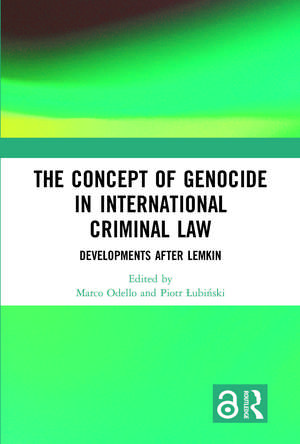The Concept of Genocide in International Criminal Law: Developments after Lemkin
Editat de Marco Odello, Piotr Łubińskien Limba Engleză Hardback – 14 iul 2020
The Polish legal expert Raphael Lemkin formulated the concept of genocide during the Nazi occupation of Europe, and it was then incorporated into the 1948 Convention on the Prevention and Punishment of the Crime of Genocide. This volume looks at the issues that are raised both by the existing international law definition of genocide and by the possible developments that continue to emerge under international criminal law. The authors consider how the concept of genocide might be used in different contexts, and see whether the definition in the 1948 convention may need some revision, also in the light of the original ideas that were expressed by Lemkin. The book focuses on specific themes that allow the reader to understand some of the problems related to the legal definition of genocide, in the context of historical and recent developments.
As a valuable contribution to the debate on the significance, meaning and application of the crime of genocide the book will be essential reading for students and academics working in the areas of Legal History, International Criminal Law, Human Rights, and Genocide Studies.
Chapter 12 of this book is freely available as a downloadable Open Access PDF under a Creative Commons Attribution-Non Commercial-No Derivatives 4.0 license available at http://www.taylorfrancis.com/books/e/9781003015222
| Toate formatele și edițiile | Preț | Express |
|---|---|---|
| Paperback (1) | 259.72 lei 6-8 săpt. | |
| Taylor & Francis – 29 apr 2022 | 259.72 lei 6-8 săpt. | |
| Hardback (1) | 1000.27 lei 6-8 săpt. | |
| Taylor & Francis – 14 iul 2020 | 1000.27 lei 6-8 săpt. |
Preț: 1000.27 lei
Preț vechi: 1219.84 lei
-18% Nou
Puncte Express: 1500
Preț estimativ în valută:
191.46€ • 208.04$ • 160.93£
191.46€ • 208.04$ • 160.93£
Carte tipărită la comandă
Livrare economică 21 aprilie-05 mai
Preluare comenzi: 021 569.72.76
Specificații
ISBN-13: 9780367858193
ISBN-10: 0367858193
Pagini: 306
Ilustrații: 4 Tables, black and white
Dimensiuni: 156 x 234 x 19 mm
Greutate: 0.45 kg
Ediția:1
Editura: Taylor & Francis
Colecția Routledge
Locul publicării:Oxford, United Kingdom
ISBN-10: 0367858193
Pagini: 306
Ilustrații: 4 Tables, black and white
Dimensiuni: 156 x 234 x 19 mm
Greutate: 0.45 kg
Ediția:1
Editura: Taylor & Francis
Colecția Routledge
Locul publicării:Oxford, United Kingdom
Public țintă
PostgraduateCuprins
Introduction;
PART I Theoretical and Historical Framework
PART I Theoretical and Historical Framework
- Rafał Lemkin’s Concept of Genocide vs. the Genocide Convention;
- Crime of genocide in Ukraine (1932-1933);
- Kingpins of Contention: Local-level Dynamics of Mobilization in the Rwandan Genocide;PART II International and National Legal Dimensions;
- The crime of genocide in its (nearly) infinite domestic variety;
- Responsibility of members of the government and other public officials pursuant to Article IV of the 1948 UN Convention on the Protection and Punishment of the Crime of Genocide;
- Transnational Corporations’ Liability for Genocide under International Law;PART III Challenges and New Developments;
- Probing the Boundaries of the Genocide Convention: Children as a Protected Group;
- Interaction between Genocide and Superior Responsibility - Conviction for a Special Intent Crime without Proving Special Intent!?;
- "Kill Them All and Let God Sort Them Out" or Why Religiously Motivated Terrorism Should Not Be Confused with the Crime of Genocide
- Blurring the Distinction between Ethnic Cleansing and Genocide;
- Genocide and Culture: Revisiting their Relationship 70 years after the Genocide Convention;
- Social Media Incitement to Genocide – ECHR countries perspective;
Notă biografică
Marco Odello, PhD (Madrid), LLM (Nottingham), LLB (Rome), is Reader in Law at Aberystwyth University.
Piotr Łubiński, PhD, is Senior Lecturer at the Institute of Security and Civic Education, Pedagogical University, Krakow, Poland.
Piotr Łubiński, PhD, is Senior Lecturer at the Institute of Security and Civic Education, Pedagogical University, Krakow, Poland.
Descriere
As a valuable contribution to the debate on the significance, meaning and application of the crime of genocide the book will be essential reading for students and academics working in the areas of Legal History, International Criminal Law, Human Rights and Genocide Studies.
